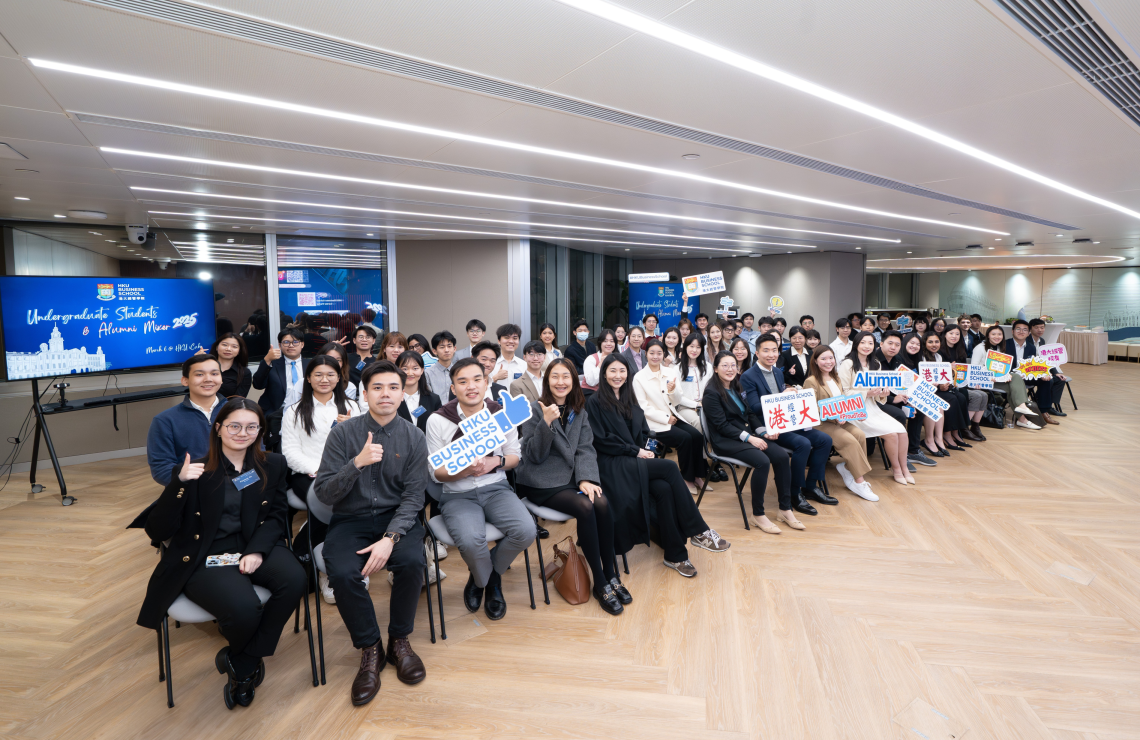HKU Business School 2024 China and Global Economic Forum Discusses the New Chapter of China’s Economy in Global Perspectives
(23 July, 2024, Hong Kong) The 2024 China and Global Economic Forum – China’s Power and New Chapter of Global Economy: Development and Outlook, hosted by HKU Business School’s Institute of China Economy (ICE), in collaboration with China Macroeconomy Forum (CMF) of the Renmin University of China, concluded successfully on 20 July 2024. The Forum gathered heavyweight economists and industry leaders to discuss the future of China’s economic development and solutions to potential challenges. Through keynote speeches and roundtable discussions, the speakers shared their insights on a wide range of hot topics in China and the global economy, and explored the new opportunities and challenges facing China and the world in the midst of the ever-changing global political and economic landscape. Co-organised with the Hong Kong Alumni Association of Renmin University of China and held at HKU Rayson Huang Theatre, the Forum brought together a diverse audience of industry leaders, academic experts, alumni and students, with nearly 400 people in attendance.
Professor Hongbin CAI, Dean and Chair of Economics, Director of ICE of HKU Business School, said in his welcoming remarks, “Hong Kong is closely linked to China’s development and we pay close attention to the various economic trends in the Mainland. I believe that this forum can help the Hong Kong community better comprehend the major trends of socio-economic development in China, and make significant contributions to our nation’s prosperous development. We are very honoured to cooperate with China Macroeconomy Forum of the Renmin University of China to build this platform for academic researchers and business leaders dedicated to studying China’s economic policies. Through the exchange of ideas, we will have a clearer understanding of China’s economic issues, and then choose the right path to tackle various challenges facing China’s economy and better understand the logic behind these policies, aiming to foster a consensus across the society.”
Professor Ruilong YANG, National First-Class Professor and Co-director of Institute of Economics of Renmin University of China, Co-chair of CMF, presented the CMF China Macroeconomy Analysis and Forecast Report for mid-2024 titled “China’s Macroeconomics under ‘Flow Recovery’ & ‘Inventory Adjustment’ – An Analysis and Outlook of China’s Economic in 2024”. He discussed the top 10 notable phenomena in China’s macroeconomy in 2024, as he pointed out that China’s economy has been generally stable with steady growth in the first half of the year, and is expected to achieve a GDP growth rate of 5%. Influenced by macro policies, real estate market adjustment and new reforms, China’s economic recovery is expected to continue gathering steam in the second half of the year amid twists and turns. Professor Ruilong YANG added, “Phased policies need to be formulated in order to achieve the expected growth. We should focus on demand management in the short term, and then the supply side’s structural reforms and improving productivity in the mid-term, while aiming at achieving high-quality development in the long-term.”
Professor Zhenhua MAO, Professor of Practice of HKU Business School and Co-chair of CMF, also presented the ICE China Economy Report of the 3rd HKU Quarterly Forum on Chinese Economy. Under the theme of “Policy Choices for China’s Economy Bottoming Out”, he analyzed six important policy options for the recovery of China’s economy. Among them, he emphasized that policies should be adopted to help stabilize real estate prices, adjust consumers’ demand and spending power, properly address and resolve the debt problem, as well as stimulate market and private investment to pursue innovation; and further enhance productivity and product quality through reform and opening up. Professor Zhenhua MAO stated, “Opening up is one of the sources of China’s economic growth and development. In addition to deepening reform and opening up, it is important to fully capitalize on the strengths of Hong Kong and the Greater Bay Area, and to accelerate the creation of a new economic dual circulation pattern through “going global and attracting foreign investment”.
The Forum was followed by inspiring keynote speeches by seven distinguished speakers. Professor Peiyong GAO, Member of Chinese Academy of Social Sciences, pointed out that “strengthening confidence and stabilizing expectations” are the top priorities of China’s current economic development under the speech titled “Emphases for Improving the Macro-Economic Governance System”. Driven by the dual engines of reforms and policies, macroeconomic policies need to be effectively extended to expectation management in order to lay a solid foundation for injecting new impetus into economic development.
Professor Xiaoqiu WU, Director of the National Institute of Financial Research, National First-Class Professor of Renmin University of China, suggested that a well-established rule of law provides an important institutional platform for China’s modernized market economy and serves as the foundation for the country’s sustainable economic development during the keynote titled “Rule of Law and Institutions: The Cornerstone of China’s Prosperous Economic Development”. He believed China needs to converge with the international community in terms of the rule of law and other institutional standards in order to fully realize China’s modernization.
Professor Yuanchun LIU, President of Shanghai University of Finance and Economics, Co-founder of CMF, focused on the theme of “Divergence and Its Causes in the Soft Landing of the Global Economy” and pointed out that there are still many unstable factors in the global market despite the prompt decisions and efforts made by the United States and European countries that have successfully achieved the expected soft landing for global economy. Therefore, the soft landing may only be “a flash in the pan”, and it is expected that the world economy will continue to diverge due to the impacts of geopolitics, technological development, and population movement across labor markets of different nations.
Professor Shusong BA, Managing Director and Chief China Economist of Hong Kong Exchanges and Clearing Limited, Member of the Chief Executive’s Policy Unit Expert Group, analyzed the prospects of Renminbi internationalization on the topic of “What are the latest market changes driven by the internationalization of Renminbi? What support can Hong Kong provide?”. He pointed out that a sound financial system is needed to further enable Renminbi to be used as a settlement instrument in investments or reserves in more countries, and that Hong Kong, as an offshore market, can play a complementary role in this regard and bring breakthroughs to the internationalization of Renminbi.
Professor Chen LIN, Associate Dean (Research and Knowledge Exchange) of HKU Business School, Chair of Finance, shared insights on the Web3 development around the world under the theme of “Development of Web3 Industry in Hong Kong”. He elaborated that Web3 and cryptocurrencies have been gradually accepted in traditional investments in foreign countries and have created rising synergies, which is an experience worthwhile for Hong Kong and the Mainland to learn from.
Professor Guojun HE, Associate Director of Institute of China Economy, Professor in Economics, Management and Strategy of HKU Business School, spoke on the topic of “Climate Change, Risks of Natural Disasters and Responses”, pointing out that both China and foreign countries need to proactively seek ways to mitigate the impacts of climate change around the world, both at the national macro-policy level as well as at the micro-enterprise decision-making level.
Professor Zhiwu CHEN, Chair Professor of Finance of HKU Business School, examined the history of China’s maritime trade since the Tang Dynasty and how Deng Xiaoping’s reforms have gradually shaped the business culture in modern China, and laid the foundation for the nation’s reforms and opening up from a historical macro perspective, on the topic of “Looking at Deng Xiaoping’s Open Door Policy through the Lens of 2,000 Years of History: How Foreign Trade Transformed China”.
Two roundtable discussions were also conducted during the Forum. In the morning session of the Roundtable on Economics titled “Analysis and Discussion on Current China Macroeconomic Situation”, speakers pointed out that there were still uncertainties in China’s economy despite a recovery in the first half of the year. Apart from relying on international trade and investment to support economic development, it is also necessary for the country to address the problems of weak domestic consumption demand and the unexpected growth in exports. The speakers also predicted that a new round of industrial shift would take place internationally in the next five to ten years. With China’s manufacturing industry accounting for approximately 30% of the world’s total, coupled with its rapid application of innovative technologies, it is believed that China will become a major force and provide a strong foundation in the upcoming industrial shift.
In the afternoon, panellists at the Roundtable on Finance titled “China and Hong Kong Macro and Micro Finance: Challenges and Prospects” highlighted that Hong Kong, as a Renminbi offshore center, is the “bridgehead” of the Greater China region and acts as an important bridge connecting China and the world. Mutual collaboration between Hong Kong and the Mainland should be advocated in terms of financial innovation, so as to fully utilize the linkage effect that Hong Kong, as an international financial center, has brought to the economic development of the Mainland.
Photo Caption
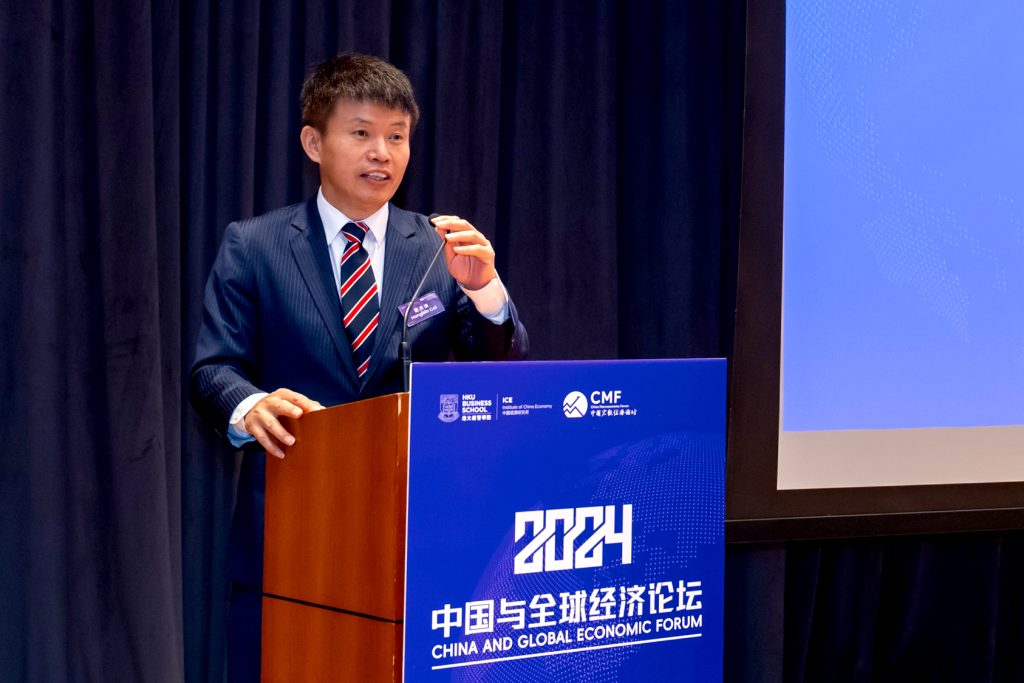
Professor Hongbin CAI, Dean and Chair of Economics, Director of Institute of China Economy (ICE) of HKU Business School, delivers the welcoming remarks.
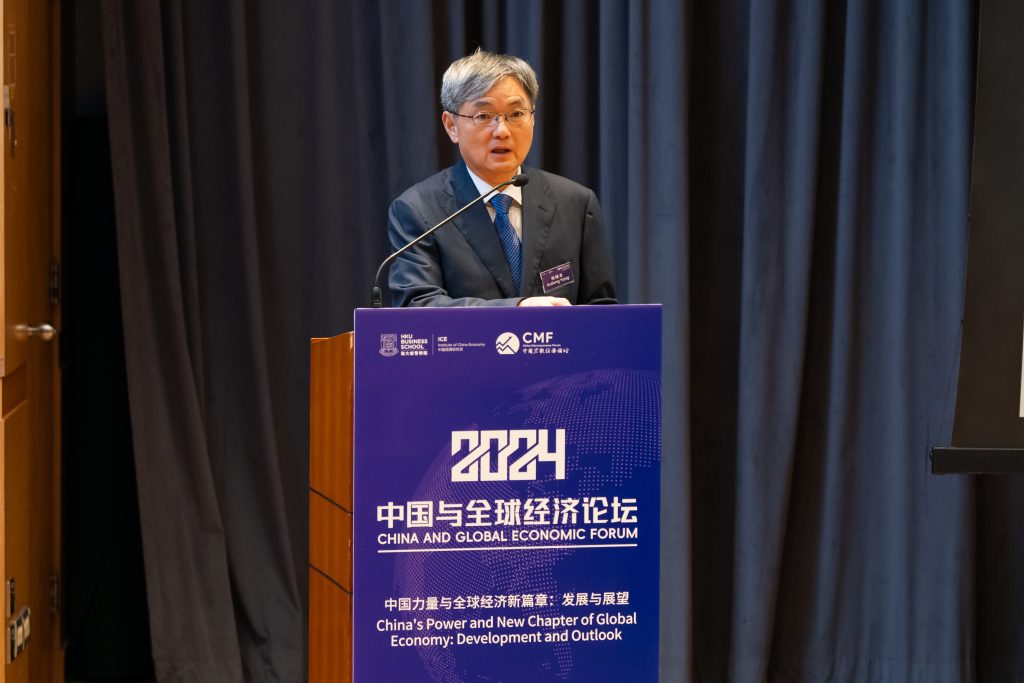
Professor Ruilong YANG, National First-Class Professor and Co-director of Institute of Economics of Renmin University of China, Co-chair of China Macroeconomy Forum (CMF), presents the CMF China Macroeconomy Analysis and Forecast Report for mid-2024.
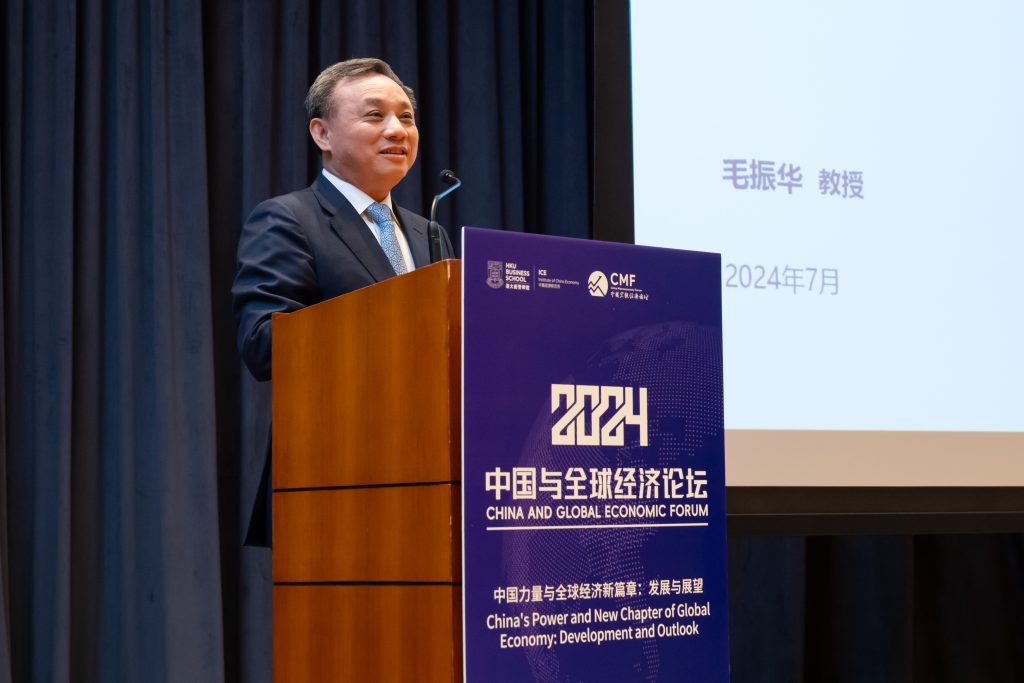
Professor Zhenhua MAO, Professor of Practice of HKU Business School and Co-chair of CMF, presents the ICE China Economy Report.

Professor Peiyong GAO, Member of Chinese Academy of Social Sciences, delivers a keynote speech.
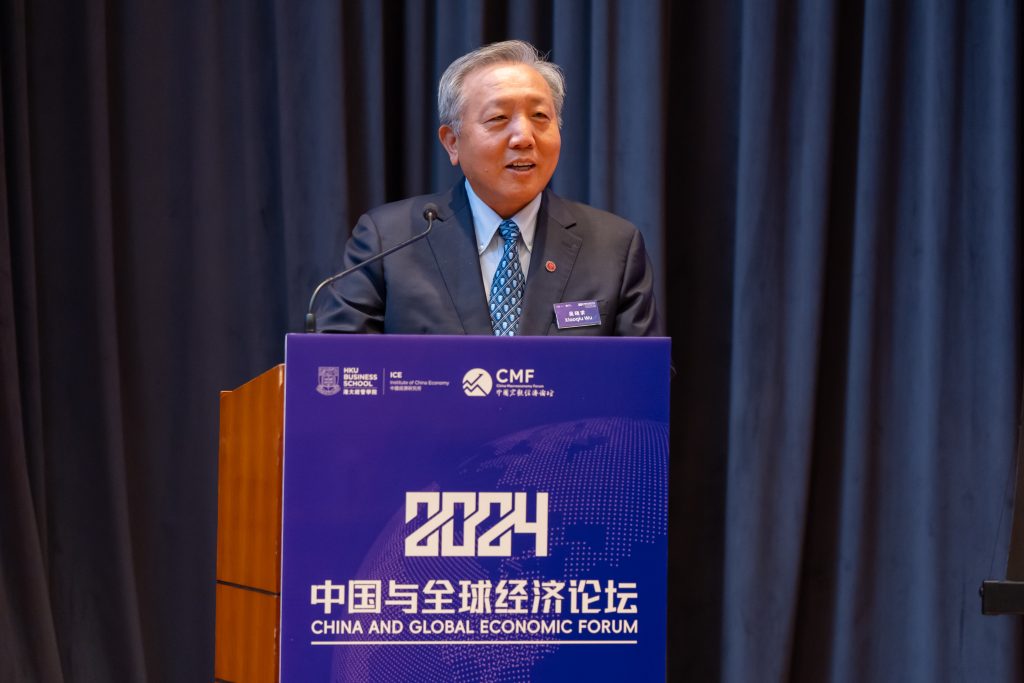
Professor Xiaoqiu WU, Director of the National Institute of Financial Research, National First-Class Professor of Renmin University of China, delivers a keynote speech.
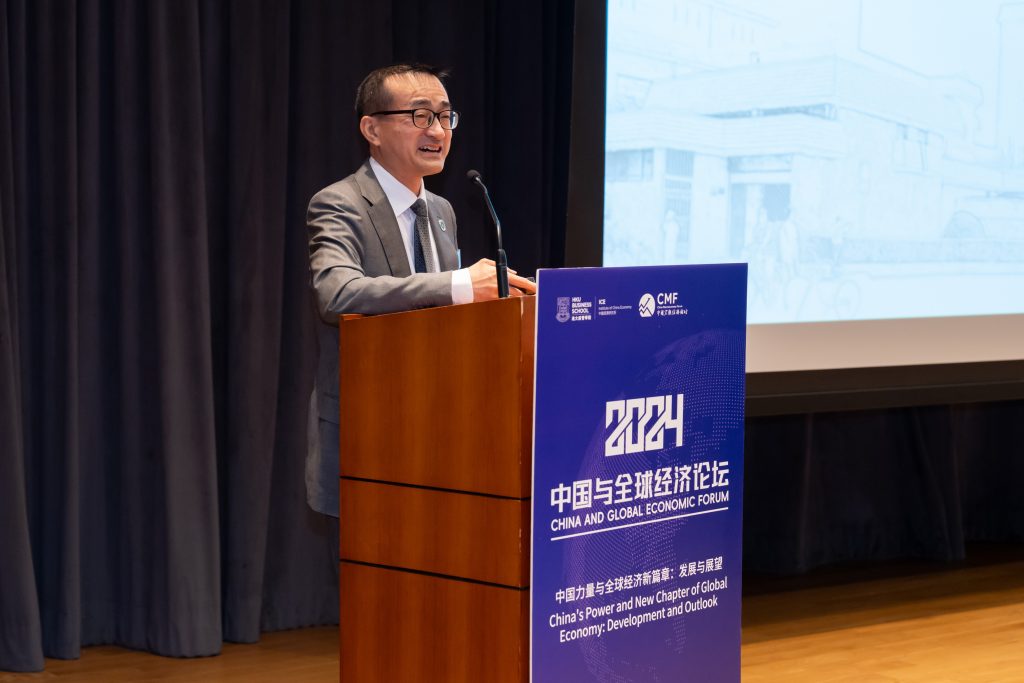
Professor Yuanchun LIU, President of Shanghai University of Finance and Economics, Co-founder of CMF, delivers a keynote speech.
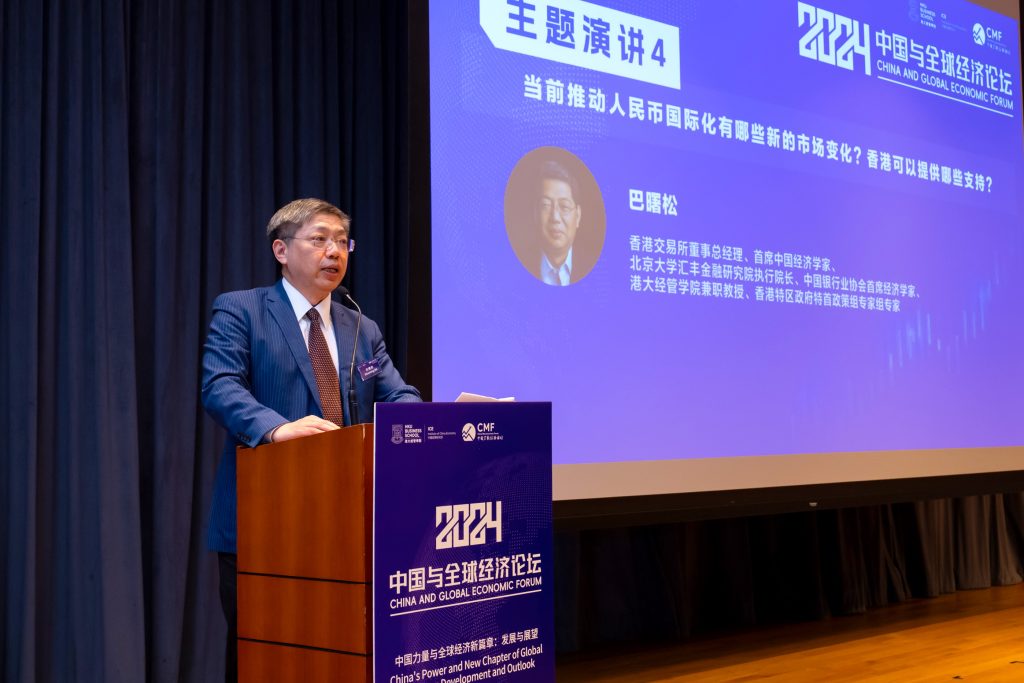
Professor Shusong BA, Managing Director and Chief China Economist of Hong Kong Exchanges and Clearing Limited, Member of the Chief Executive’s Policy Unit Expert Group, delivers a keynote speech.
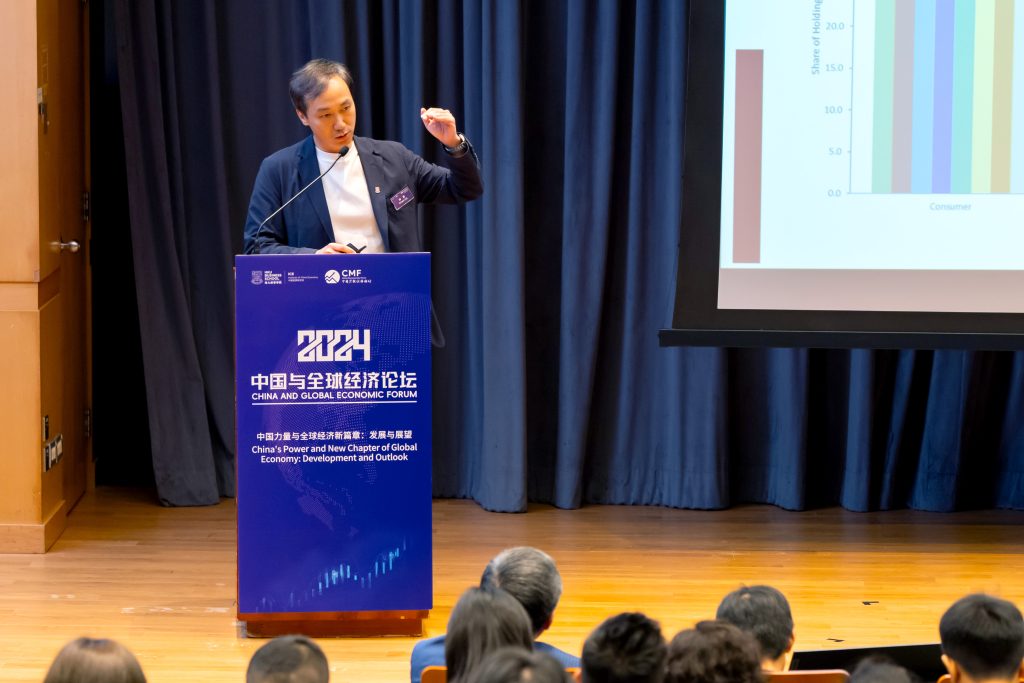
Professor Chen LIN, Associate Dean (Research and Knowledge Exchange) of HKU Business School, Chair of Finance, delivers a keynote speech.

Professor Guojun HE, Associate Director of Institute of China Economy, Professor in Economics, Management and Strategy of HKU Business School, delivers a keynote speech.
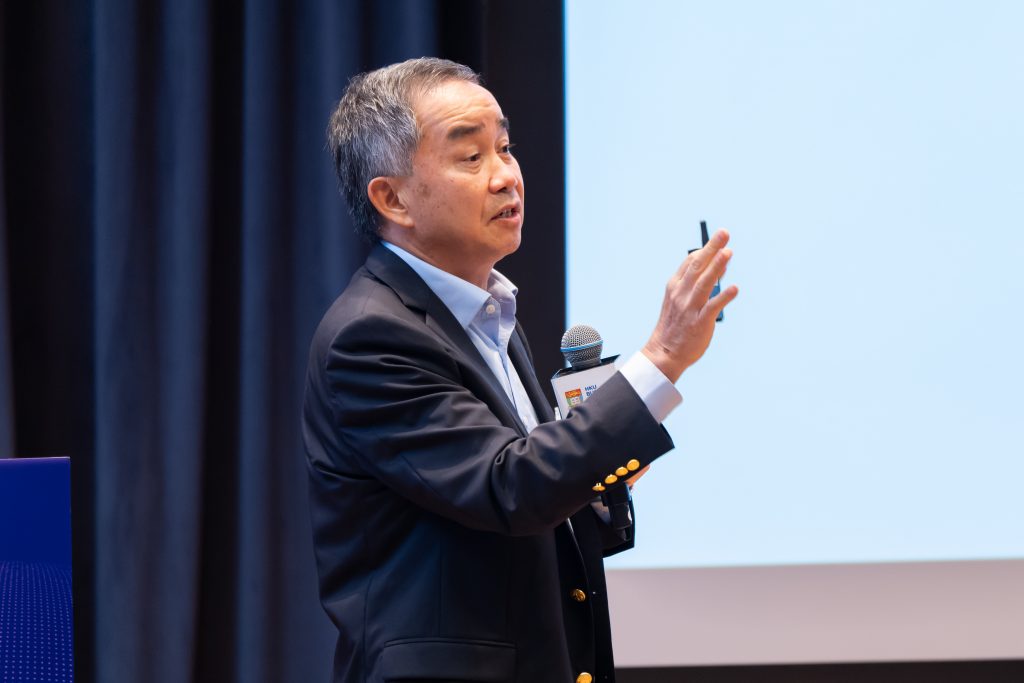
Professor Zhiwu CHEN, Chair Professor of Finance of HKU Business School, delivers a keynote speech.
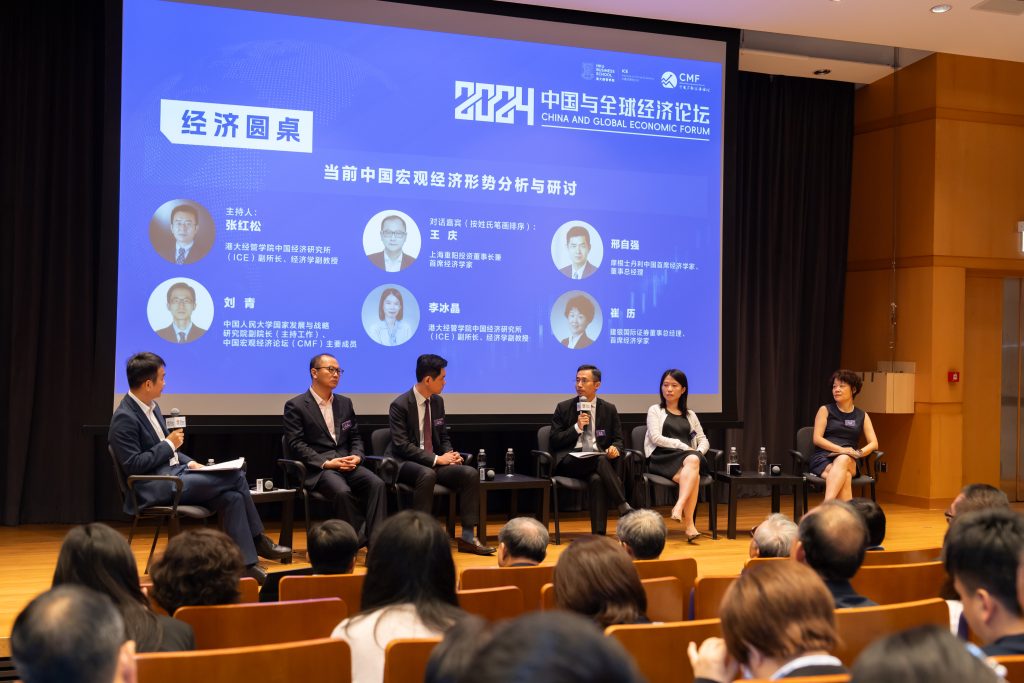
(From second left) Dr. Qing WANG, Chairman & Chief Strategist of Shanghai Chongyang Investment Management; Mr. Ziqiang XING, Chief China Economist and Managing Director of Morgan Stanley; Professor Qing LIU, Deputy Dean of National Academy of Development and Strategy of Renmin University of China, Member of CMF; Professor Bingjing LI, Associate Director of Institute of China Economy, Associate Professor of Economics of HKU Business School; Dr. Li CUI, Chief Economist and Managing Director of CCB International Securities Limited, participate in the Roundtable on Economics titled ‘Analysis and Discussion on Current China Macroeconomic Situation’, moderated by Professor Hongsong ZHANG (first left), Associate Director of Institute of China Economy, Associate Professor of Economics of HKU Business School.
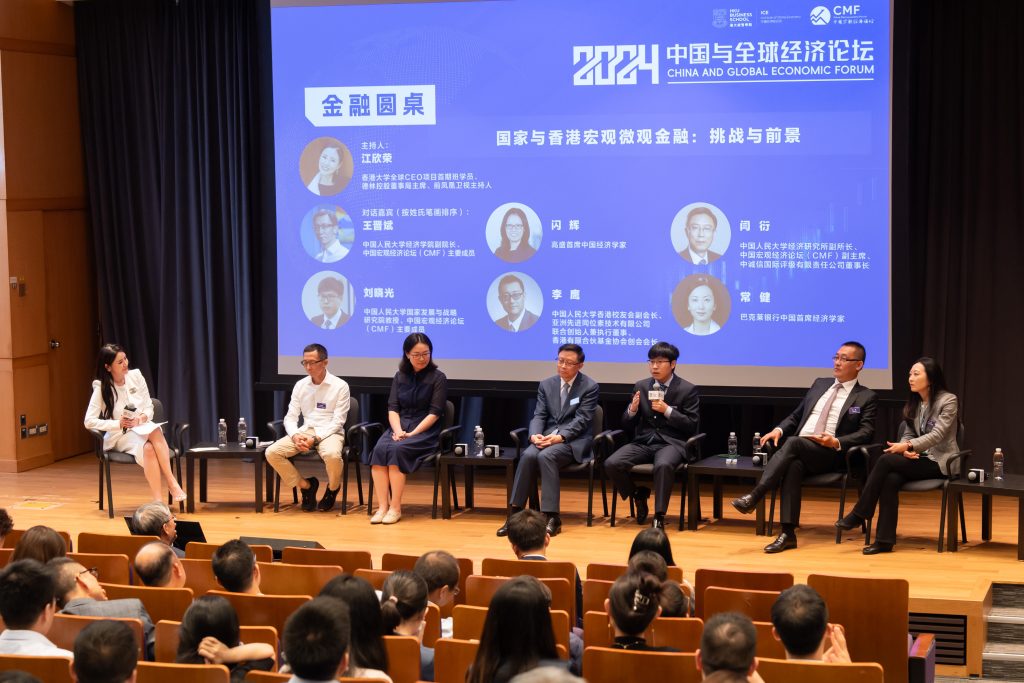
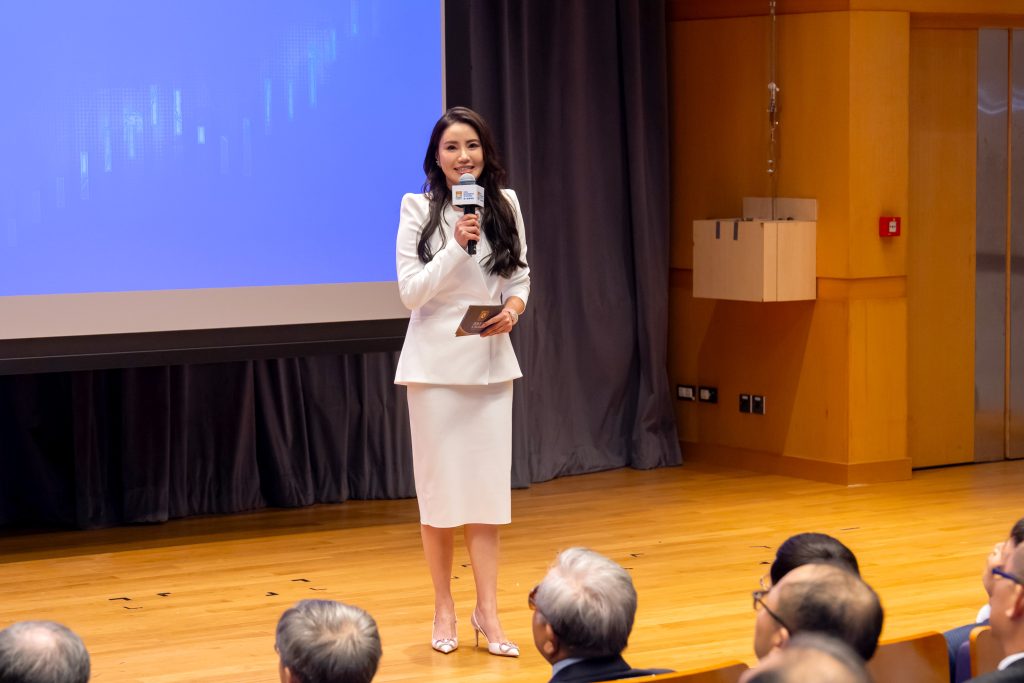
(Upper photo – From second left) Professor Jinbin WANG, Deputy Dean of School of Economics of Renmin University of China, Member of CMF; Dr. Hui SHAN, Chief China Economist of Goldman Sachs; Professor Yan YAN, Assistant Dean of the Economic Research Institute of Renmin University of China, Vice Chairman of CMF; Professor Xiaoguang LIU, Professor of National Academy of Development and Strategy of Renmin University of China, Member of CMF; Mr. Ying LI, Vice President of Hong Kong Alumni Association of Renmin University of China; Ms. Jian CHANG, Chief China Economist of Barclays Bank, participate in the Roundtable on Finance titled ‘China and Hong Kong Macro and Micro Finance: Challenges and Prospects’, moderated by Ms. Crystal JIANG (lower photo), Chairman of the Board of Directors of DL Holdings Group.
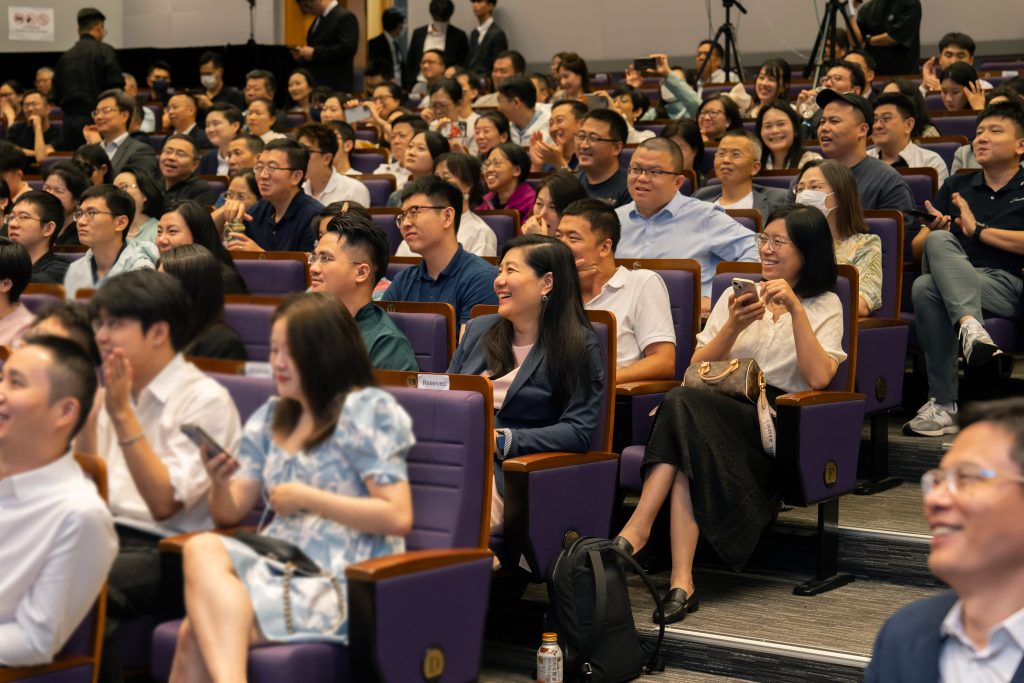
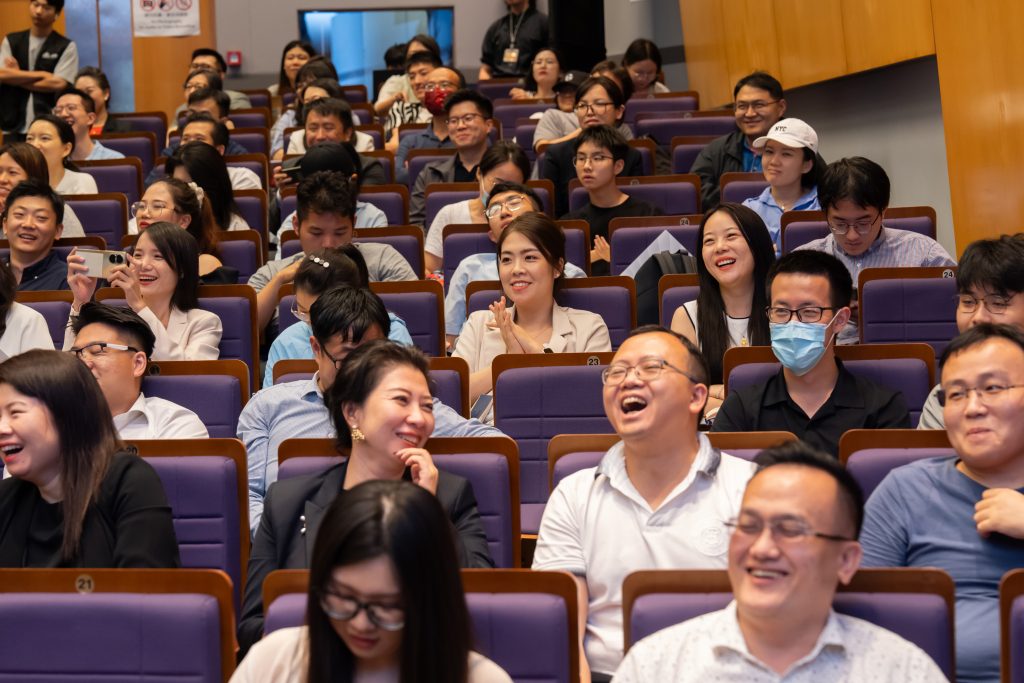
Held at HKU, the Forum brought together a diverse audience of academic experts, industry leaders, alumni and students, with nearly 400 people in attendance.
Hi-res photos are available here.
Click the links below for the full video recording:






